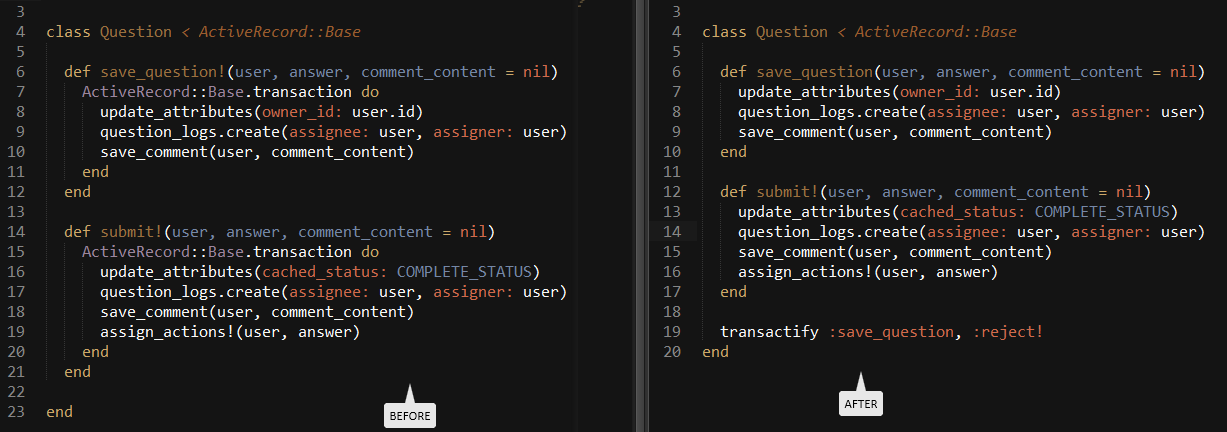Transactify
Transactify gem can run your methods in database transaction. Previously you had to wrap you code in ActiveRecord::Base.transaction do .. end but now it can be done in much more simpler way.
Sample or usage: https://github.com/igorkasyanchuk/transactify/blob/master/spec/app.rb#L20
Installation
Add this line to your application's Gemfile:
gem 'transactify'And then execute:
$ bundle
Or install it yourself as:
$ gem install transactify
Note: works only for Ruby 2+
Usage
Let's say you have model Question with method reject!.
def reject!(comment_text = nil)
assignment_log = question_logs.where(action_type: ASSIGNED_STATUS).last
owner.rejected_questions << self
owner.update_attribute(average_assigned_questions_count: question_count/total_questions)
log = question_logs.create(assignee: assignment_log.assigner, assigner: assignment_log.assignee, action_type: REJECTED_STATUS)
QuestionMailer.update(self, log).deliver_later
endNow imagine that total_questions returns 0. And you will have an exception (dividing by zero), but one operation (owner.rejected_questions << self) will be performed to the DB. This is wrong, and normally you can avoid this by adding Transactions:
def reject!(comment_text = nil)
ActiveRecord::Base.transaction do
assignment_log = question_logs.where(action_type: ASSIGNED_STATUS).last
owner.rejected_questions << self
owner.update_attribute(average_assigned_questions_count: question_count/total_questions)
log = question_logs.create(assignee: assignment_log.assigner, assigner: assignment_log.assignee, action_type: REJECTED_STATUS)
QuestionMailer.update(self, log).deliver_later
end
endBut what if you have many-many such methods? This is where transactify gem can help. You can speficy which methods you want to run in transaction. So final code will looks like:
def reject!(comment_text = nil)
assignment_log = question_logs.where(action_type: ASSIGNED_STATUS).last
owner.rejected_questions << self
owner.update_attribute(average_assigned_questions_count: question_count/total_questions)
log = question_logs.create(assignee: assignment_log.assigner, assigner: assignment_log.assignee, action_type: REJECTED_STATUS)
QuestionMailer.update(self, log).deliver_later
end
transactify :reject! # With this line you can specify which methods you want to make safe for DBMain benefit of this gem is that you don't need to edit all your methods and add transaction blocks. So without any existing code modification you can add support for transaction for whole methods.
Gem allows to transactify instance and class methods.
Functionality
include Transactify - put in your classes, models to add support for transactions
transactify :method_name - transactify your insatance method.
ctransactify :method_name - transactify your class method.
Samples of Usage
class Question < ActiveRecord::Base
include Transactify
transactify :reject!, :save_question
ctransactify :generate_report
def reject!(comment_text = nil)
assignment_log = question_logs.where(action_type: ASSIGNED_STATUS).last
owner.rejected_questions << self
owner.update_attribute(average_assigned_questions_count: question_count/total_questions)
log = question_logs.create(assignee: assignment_log.assigner, assigner: assignment_log.assignee, action_type: REJECTED_STATUS)
QuestionMailer.update(self, log).deliver_later
end
def save_question(user, answer, comment_content = nil)
update_attributes(owner_id: user.id)
question_logs.create(assignee: user, assigner: user, action_type: SAVE_STATUS, answers: answer)
save_comment(user, comment_content)
end
def self.generate_report
report = Report.create_new_report
report.create_schema
report.populate_users
report.populate_questions
report
end
endPlans
- Add support for Sequel gem
- Add more specs
Development
After checking out the repo, run bin/setup to install dependencies. Then, run bin/console for an interactive prompt that will allow you to experiment.
To install this gem onto your local machine, run bundle exec rake install. To release a new version, update the version number in version.rb, and then run bundle exec rake release to create a git tag for the version, push git commits and tags, and push the .gem file to rubygems.org.
Contributing
- Fork it ( https://github.com/[my-github-username]/transactify/fork )
- Create your feature branch (
git checkout -b my-new-feature) - Commit your changes (
git commit -am 'Add some feature') - Push to the branch (
git push origin my-new-feature) - Create a new Pull Request

